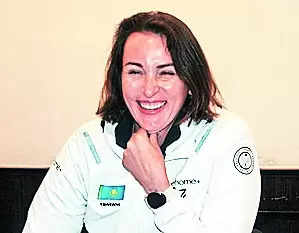Kolkata: Being a sportswoman and a mother is an extremely tough job, more so in an individual sport like tennis, where a lot of travelling is involved. Established players like Sania Mirza, Serena Williams, Kim Clijsters, Victoria Azarenka and now Caroline Wozniacki and Naomi Osaka have all played that dual role with remarkable grit, coming back after maternity break to handle the two extreme situations.
No one perhaps displayed this grit more than Yaroslava Shvedova, who decided to make a comeback to professional tennis after the birth of her twins in 2018.“It’s very difficult,” is how Kazakhstan’s Shvedova simply put it with a giggle. “I didn’t know I would come back,” she told TOI during the ITF Junior meet at the BTA complex. The 36-year-old Shvedova, now a coach, has accompanied a few of her trainees here.
“I had stopped playing in 2017 after an ankle surgery. Then I had my kids and I decided to start practising again. There was this rule change where I got an opportunity to play in another Olympics, my third, and I decided to grab it. So there I was, training hard and at the same time taking care of my kids,” she stated.
Shedova admits that being a professional player and a mother needs a lot of juggling. “You have to be a 100 per cent mother and at the same time, a 100 per cent tennis player. To be honest, I wasn’t prepared for it. All my career I was a 100 per cent tennis player and here I was, breaking myself in two, trying to give 100 per cent to both. In the end, I decided to give myself a year for tennis, to ensure that I do not leave on a bad note.”
After the Tokyo Olympics, Shvedova decided to retire from the game and focus on the life ahead with her children.
In this one year, she had travelled twice with her twins and it had not been easy. “Even while on the court, I was constantly thinking about them, whether they had eaten properly, had slept well, were they fighting with each other…” It is the same with other tennis mothers, she says. Shvedova and Sania last played doubles as partners in 2017, when they would mostly talk about tennis. However, after they had their children, whenever they would meet, the discussions would be more about their kids and relationships.
“Tennis mothers have different reasons to come back, some handle it pretty well too,” Shvedova said. “It is all about striking the right balance. Having been a tennis mother, my advice to them would be to continue as long as you enjoy it and not sacrifice stuff. Don’t be too tough on yourself. Sometimes you have to accept the circumstances and let go.”
Despite the difficulties, Shvedova is proud that tennis mothers like her are sending out a strong message. “For female athletes, a career does not have to end with childbirth. Just like men, they too can continue playing after having kids.”
No one perhaps displayed this grit more than Yaroslava Shvedova, who decided to make a comeback to professional tennis after the birth of her twins in 2018.“It’s very difficult,” is how Kazakhstan’s Shvedova simply put it with a giggle. “I didn’t know I would come back,” she told TOI during the ITF Junior meet at the BTA complex. The 36-year-old Shvedova, now a coach, has accompanied a few of her trainees here.
“I had stopped playing in 2017 after an ankle surgery. Then I had my kids and I decided to start practising again. There was this rule change where I got an opportunity to play in another Olympics, my third, and I decided to grab it. So there I was, training hard and at the same time taking care of my kids,” she stated.
Shedova admits that being a professional player and a mother needs a lot of juggling. “You have to be a 100 per cent mother and at the same time, a 100 per cent tennis player. To be honest, I wasn’t prepared for it. All my career I was a 100 per cent tennis player and here I was, breaking myself in two, trying to give 100 per cent to both. In the end, I decided to give myself a year for tennis, to ensure that I do not leave on a bad note.”
After the Tokyo Olympics, Shvedova decided to retire from the game and focus on the life ahead with her children.
In this one year, she had travelled twice with her twins and it had not been easy. “Even while on the court, I was constantly thinking about them, whether they had eaten properly, had slept well, were they fighting with each other…” It is the same with other tennis mothers, she says. Shvedova and Sania last played doubles as partners in 2017, when they would mostly talk about tennis. However, after they had their children, whenever they would meet, the discussions would be more about their kids and relationships.
“Tennis mothers have different reasons to come back, some handle it pretty well too,” Shvedova said. “It is all about striking the right balance. Having been a tennis mother, my advice to them would be to continue as long as you enjoy it and not sacrifice stuff. Don’t be too tough on yourself. Sometimes you have to accept the circumstances and let go.”
Despite the difficulties, Shvedova is proud that tennis mothers like her are sending out a strong message. “For female athletes, a career does not have to end with childbirth. Just like men, they too can continue playing after having kids.”
